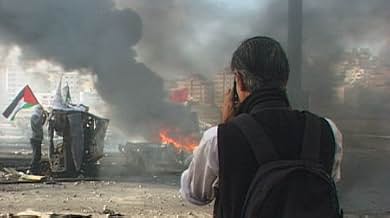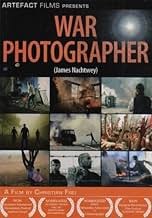War Photographer
- 2001
- 1h 36min
Documental sobre el fotógrafo de guerra James Nachtwey, considerado por muchos el mejor fotógrafo de guerra de la historia.Documental sobre el fotógrafo de guerra James Nachtwey, considerado por muchos el mejor fotógrafo de guerra de la historia.Documental sobre el fotógrafo de guerra James Nachtwey, considerado por muchos el mejor fotógrafo de guerra de la historia.
- Nominado a 1 premio Óscar
- 7 premios ganados y 4 nominaciones en total
Opiniones destacadas
The photographer, James Nachtwey, is a cool, philosophical individual, motivated by the goodness he feels motivates humanity--in spite of the horrors he deals with on the killing fields. We have all come across the trashy photos that adorn the covers of National Enquirer, pictures that titillate and appeal to our worst natures--Nachtwey's hard-earned photos do just the opposite--they appeal to our compassion, are meant to give us insight into the human condition, the humanity we all share--and in doing so elevate all of us, enrich humanity.
War Photographer is often a frankly brutal film, but it's overall impact is significantly uplifting. One greatly admires James Nachtway for his goals and is astonished by his photography.
Originally commissioned for Swiss television, this documentary by Christian Frei may be hard to track down, but it might be one of the most memorable films you will ever see. More user comments probably will say "this film is not for the squeamish," but what we see here is the real-life inferno of war and poverty. And if you have never been subject to war and poverty you HAVE to see (Nachtwey's) photography, which demonstrates what the human race is capable of and what it looks like...
Although it's difficult to watch all the evil that war brings, we should congratulate the viewers who try to remain calm. The documentary also invites the audience to question humanity, good and evil at length. Watching the story of James, an important journalist who hopes that good and morality will one day prevail over evil, will add very positive things to you. In addition, the community of people who call themselves photographers and journalists but don't see this as anything other than making a profit from their job should also watch it.
As such, while I have profound respect for Nachtwey's efforts, his results and evidently his civility in the face of brutality, this film I think is not an essential watch. If you are like me, and feel it is important to remind yourself of how privileged your existence is from time to time, this will suffice. But not as well as an afternoon at a soup kitchen...
I think there is no doubt as to the bravery of a war photographer, in my naivete, I did not think that some folks saw them as crass profiteers until seeing this film (and reading some commentary online. "Vampirism" is addressed obliquely in the film. Well, all aspects are addressed obliquely in this film.
Back to "vampirism," again even if a person were greedy, that would not deny his/her bravery. As I write this, all I know is that Nachtwey was injured in early December along with Michael Weisskopf who allegedly was very heroic in harm's way. I've not seen many updates since the initial reports, and it's been nearly a month. At this time, I should also point out there is a jamesnachtwey.com with some of the photos from this film.
In hindsight, I would suggest viewing more photos, while reading the text of interviews with Nachtwey and skip this film.
There are some creative microcameras used to put us not only in Nachtwey's shoes, but in his lens. I found them quickly a distraction, if not an annoyance. And sometimes there would be a lengthy microcamera shot looking back at Nachtwey's brow, properly furrowed as he took in the atrocity at hand.
Images from a sulfur mine (moving from martial to capitalistic crimes?) were eerily beautiful, especially in video format. And video was another problem for me, personally I prefer it to photography. Whether for a wedding, or a war.
But video certainly in its elongation of time, rather than a snapshots snap moment, makes you wonder about the before and after of activities. We demand more from video, with photos we demand more from ourselves.
We see Palestinians with rocks, slingshots and molitov cocktails hurling blindly though smoke and over and around concrete. No story behind why they are there, and some of them seem quite young. A pet peeve of mine is why kids are allowed in harms way in such settings.
People in Jakarta are living near the train tracks, and one family is given specific focus. The message is that these people are just like you, striving to support their children...
But again the video makes me wonder about that family some more. The father has lost an arm and a leg to the trains that he now keeps his family living near by, and unlike the other families, in lean-to's off to the side of the tracks, they are shown "sleeping" right between the tracks.
These questions pop up with video, whereas I think a few photographs and Nachtwey's words voiced over or written in an article would not.
In conclusion, I feel somewhat conflicted giving this less than a 6, especially as I am more than likely aligned with the general beliefs of Nachtwey. His stated belief in the importance of one life is something that I think as individuals we have to try and assert knowing that governments and companies understand how cheap human life is.
That's a tricky balance, and one hard to put on video, possibly better left to a photo and then meditated upon by each one us. We do see many photos here, but then as they are "embedded" in video, they are tainted by that. It happens with embedding I think...the meter is running and the demands of the film must be met. Maybe I should have hit the pause button for each photo?
With hope, soon Nachtwey will be well from his wounds, and again able to document the wounds of the world for us.
5/10
¿Sabías que…?
- Citas
James Nachtwey: It's more difficult to get publications to focus on issues that are more critical, that do not provide people with as escape from reality but attempt to get them deeper into reality. To be concerned about something much greater than themselves. And I think people are concerned. I think quite often, publishers don't give their audience enough credit for that. In fact, at the end of the day, I believe people do want to know when there's some major tragedy going on; when there's some unacceptable situation happening in this world. And they want something done about it. That's what I believe. We must look at it. We're required to look at it. We're requited to do what we can about it. If we don't, who will?
- ConexionesFeatured in Docventures: Totuus (2014)
- Bandas sonorasThe River
Composed by Eleni Karaindrou
Performed by String Orchestra
Conducted by Lefteris Halkiadakis (as Lefteris Chalkiadakis)
Selecciones populares
- How long is War Photographer?Con tecnología de Alexa
Detalles
- Fecha de lanzamiento
- País de origen
- Sitio oficial
- Idiomas
- También se conoce como
- Военный фотограф
- Locaciones de filmación
- Productoras
- Ver más créditos de la compañía en IMDbPro
Taquilla
- Total en EE. UU. y Canadá
- USD 61,040
- Fin de semana de estreno en EE. UU. y Canadá
- USD 9,327
- 23 jun 2002
- Total a nivel mundial
- USD 86,863
Contribuir a esta página




















